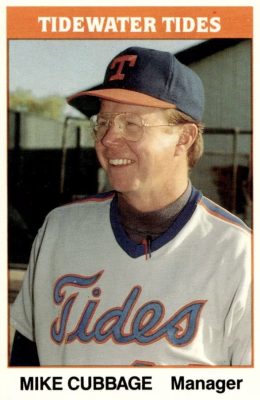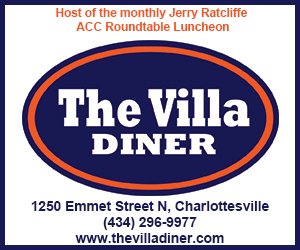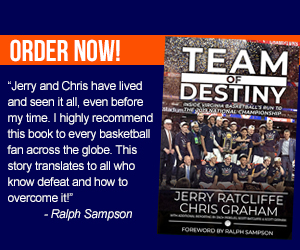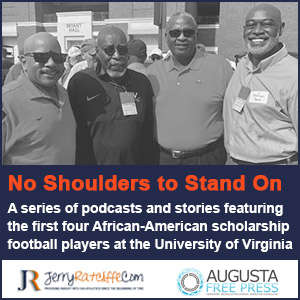Charlottesville’s Mike Cubbage: 50 golden years of memories
By Jerry Ratcliffe
 Before the pandemic, a group of men in Central Virginia would gather every six weeks for a luncheon, but mostly to regale with stories from their illustrious careers.
Before the pandemic, a group of men in Central Virginia would gather every six weeks for a luncheon, but mostly to regale with stories from their illustrious careers.
Longtime UVA chief sports trainer Joe Gieck, professor emeritus of sports medicine, organized the lunches, affectionately naming it the “Dr. Frank McCue, Jim West Memorial Lunch.” Because of the stature of the guests, outsiders referred to it as “The Legends Lunch.”
The once-popular Lord Hardwick’s was the host site for years until it went out of business, and with a little pull from Gene Corrigan, it moved to a special room at Glenmore Golf Club. Corrigan was former commish of the ACC, former AD at Washington & Lee, Virginia and Notre Dame.
Some of the regular guests of the lunch were Corrigan, Terry Holland, Fletcher Arritt, Barry Parkhill, Danny Wilmer, Bill Millsaps, Gene Arnette, Rich Murray, Ace Harrison, Jim “Ace” Adams, Dr. Joe May, Gordon Burris, David Sloan, Alan Dillard, Larry Dofflemeyer, Chuck Rotgin, Joe Gieck (of course), yours truly and Mike Cubbage among others from time to time.
The pandemic halted the luncheons, which I hope will get a new start, even though so many members of the group have passed.
The stories were golden, the fellowship even better. Those luncheons were treasures.
We lost another member of that cherished group last weekend when Cubbage lost a nearly year-long fight with cancer (obituary). “Cubby,” as we all affectionately called him, was arguably the best athlete ever produced in Charlottesville.
A standout, three-sport star at Lane High School, Cubby once told me that he was offered football scholarships by a number of colleges, even took a visit to Alabama and met with legendary Bear Bryant, who questioned Cubby’s weight for a football player.
Even a few college basketball programs were interested, as were some Major League Baseball clubs, although Cubbage decided to accept an offer to become the very first baseball scholarship player at hometown Virginia.
 He went on to play football and baseball at UVA until he realized his road to professional sports was the latter, and Jim West brought out Cubby’s best, leading to a 50-year career in pro baseball as a player, manager, coach and scout.
He went on to play football and baseball at UVA until he realized his road to professional sports was the latter, and Jim West brought out Cubby’s best, leading to a 50-year career in pro baseball as a player, manager, coach and scout.
“I’ve got memories at every level,” Cubby told me in an interview in 2022, upon his induction into the state of Virginia Sports Hall of Fame, one of the numerous halls of fame in which he belonged.
“My memories of high school are as strong as any because of how good we were. The Lane winning streak, the crowds we played in front of.
“Back in those days, we were drawing like half the crowd that Virginia was playing in front of. We were getting 6,000 to 7,000 standing room only every game. Virginia was probably drawing 12,000 to 14,000.”
Lane owned a 53-game unbeaten streak from the early 1960s until 1970, and had three consecutive all-state quarterbacks in Arnette (UVA), David Trice (Duke) and Cubby (UVA).
Cubbage teamed up with another Hall of Famer, Frankie Allen, for two great basketball seasons leading to the state semifinals under Chip Conner, Cubbage’s favorite UVA basketball player, who came to coach Lane.
Moving on to UVA, Cubbage had been named the Cavaliers’ starting quarterback his sophomore year and suffered a dislocated elbow, which changed his future. The injury opened his eyes.
“To tell the truth, my heart wasn’t really in football, and playing two sports and not being quite as dedicated to football at that level, it was an easy decision,” Cubby said. “I was never going to become a pro football player. I didn’t even go to spring practice because I was playing baseball.”
He could have gone straight to pro baseball out of Lane, but felt like some time at UVA would help him develop.
“Playing for Jim West, I got to mature under him. I got better as a player and grew up as a man under the tough love that Jim was known for. That got me ready to go out and play pro ball. Before then, I just wasn’t ready.”
Cubbage played three years of summer ball as well during his UVA career, two in the Valley League and a year in South Dakota. Then came the minors and onto the MLB where he played from 1974 — Texas Rangers, Minnesota Twins (where he hit for the cycle) and the New York Mets — through 1981.
“Billy Martin was my first manager. Gene Mauch was my favorite manager, the most brilliant man I’ve ever met in a baseball uniform,” Cubbage said. “I got to work and play for a lot of other great managers including Hall of Famers Tommy Lasorda and Joe Torre.”
 Cubby played with Rod Carew and Harmon Killebrew. He coached Hall of Famers in Houston, including Randy Johnson, Jeff Bagwell and Craig Biggio, then Pedro Martinez, Billy Wagner and David Ortiz in Boston, climaxing a 14-year run as a major league coach and manager.
Cubby played with Rod Carew and Harmon Killebrew. He coached Hall of Famers in Houston, including Randy Johnson, Jeff Bagwell and Craig Biggio, then Pedro Martinez, Billy Wagner and David Ortiz in Boston, climaxing a 14-year run as a major league coach and manager.
“It ended a year too soon because Boston won the World Series the year after I left. I’m glad I went to Boston — if only two years, but two good years — where I got to experience the Yankees-Red Sox rivalry. Every game was a sellout at Boston and New York, and it was loud and crazy.”
His last game in a Major League uniform was Game 7 in the 2003 American League Championship Series, when New York’s Aaron Boone blasted a series-settling home run, a heartbreaker for the Sox.
“I love Aaron Boone, but every time I see him, it’s like, ‘Hey, can you come over here and take that knife out of my heart,” Cubby laughed.
In his Major League playing career, Cubbage appeared in 703 games, batting .258, including 34 home runs and 251 RBI.
When he became third base coach for Boston, I drove up to write a feature story on him at Fenway. Later, at spring training when Cubbage was named interim manager of the Red Sox, I went to Florida to write about his opportunity, talked to a bunch of the Red Sox players, who liked the idea of him leading the club. He didn’t get the full-time gig (Grady Little got the job), but stayed on as a coach for a while before moving on to the next stage — scouting.
He had also been an interim manager of the Mets in September of 1991, leading the club for the last seven games.
Cubby also was manager for three of the Mets’ minor league clubs in Jackson, Miss., Lynchburg and Norfolk before he moved up to the parent club, also as third base coach. During his minor league managing stints, he won everywhere he went.
“I got to manage five years in the state of Virginia, which I loved,” he said. “When I was done as a player, I had some offers, but when I saw that the Mets had teams in Virginia, I decided to stay with that organization. We had really good teams in Lynchburg and Norfolk.”
He scouted for Houston, Tampa and then the Washington Nationals, where he ended his career.
“When I left Tampa, I only talked to one team and kind of had my eye on coming back to the area,” Cubby said. He had maintained a permanent home in Charlottesville during his career with his wife, Jan.
“I knew the Nationals were good and that Mike Rizzo was a guy with a scouting background,” Cubbage said. “I called an old teammate of mine, Bill Singer, who was one of their scouts, and told him I was a free agent. Within two days, he put me in contact with Rizz, and I signed with the Nationals. No regrets there, especially after what happened in the fall.”
The Nationals gave Cubby a World Series championship ring to add to his massive baseball memorabilia collection. He was a rabid collector, including a lot of items related to his baseball hero, the ‘Splendid Splinter,’ Ted Williams.
During his career, Cubbage often referred to Williams’ book “The Science of Hitting,” written in 1971. Cubby considered it his baseball bible.
“I never got to play for Ted, but got to know him over the years,” said Cubbage of Williams, who was managing the Washington Senators in 1971.
Cubby seemed to know just about everybody who mattered in baseball during that sterling 50-year career.
Memories at every level. He also provided memories for all the rest of us.
Rest in Peace, Cubby. We will miss you.









